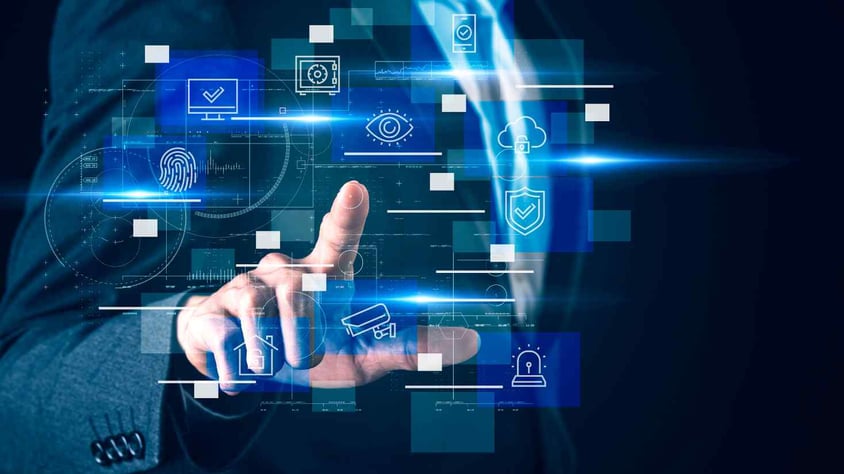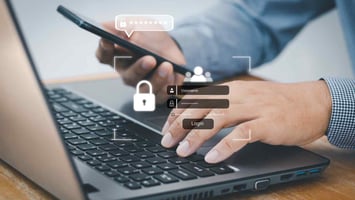It may come as a surprise to learn that official acceptance of the digital signature process has...

How Does Personal Identity Verification Work?
Personal identity verification is vital for both customers and businesses. This process is an essential layer of security to help mitigate the risks of fraud and reduce claims of indemnity amongst other illegal activities.
Fraudulent activity online has surged in recent times, with global e-commerce losses due to online payment fraud estimated at $41 billion in 2022, and $48 billion for 2023.
We live in a world with multiple personal identity verification systems now available to businesses to help protect customers and their organisations from financial damage.
In fact, around 65% of companies already deploy digital document verification, particularly those in financial services.
Contents
- What is Digital Identity Verification?
- How Does Digital Identity Verification Work?
- What is an Example of Online Identity Verification?
- Why use Identity Verification?
- Is Digital Identity Verification Important?
- Conclusion
What Is Digital Identity Verification?
Digital identity verification is the process of authenticating the identity of an individual online. This procedure involves the approval of information provided digitally by someone to prove their identity.
As organisations get to grips with rising identity fraud and indemnity claims, research shows that there will be more than 70 billion digital identity checks this year, up 16% on figures from 2023.
.png?width=1000&height=500&name=Does%20Home%20Insurance%20Cover%20My%20Personal%20Belongings%20(6).png)
These checks are vital as customers move more personal information online to pursue a range of activities, necessitating businesses to remotely authenticate customers’ identities.
In addition, digital identity verification holds an important role in regulatory compliance, especially if an organisation is in the financial or healthcare sectors.
Regulations around Anti-Money Laundering (AML) and Know Your Customer (KYC) deliver clear rules and guidance for businesses to verify customer identity to minimise the chances of fraud, and indemnity claims and support legal compliance.
How Does Digital Identity Verification Work?
Personal identity verification processes prove that someone is who they claim to be by examining their personal identity cards or identity documents to provide authentication.
In line with regulatory requirements, financial organisations ask for personal identification when customers set up a new account. This may involve scanning personal identity cards or biometric verification, including facial recognition or fingerprint analysis.
Once submitted, the process of verification can be completed if a company instigates an analysis of customer information, including any alphanumeric data, to ensure personal identity is accurate.
What Is An Example Of Online Identity Verification?
As the digital world evolves, so do the verification methods used to prove a person’s identity. Finance and customer banking are key areas where personal identity verification is vital in the provision of services.
Digital verification services can simplify remote account set up, and improve the flexibility of services offered. Banks facilitate verification through API (Application Programming Interfaces) where users share data, passing official documents through document verification software for increased security.
Financial organisations often employ a range of digital verification processes, such as two-factor authentication (2FA) which combines dual verification to prove identity. This could include email or phone verification alongside the initial information entry online.
Leveraging technological advancements, some financial institutions use liveness detection to make identity verification more comprehensive. Liveness detection ensures the user is physically present for identity approval.
Why Use Identity Verification?
There are a multitude of benefits, as personal identification is the first line of defence against nefarious actors intent on fraud. As bank users undergo digital identity verification, they are certifying that financial institutions are dealing with authenticated customers.
Even though online verification checks are now widespread, scams and identity theft are on the rise. In 2020, 47% of all global companies reported these types of fraud were affecting business and data from 2023 suggests this upward tick is continuing.
Another critical factor in personal identity verification is Customer Due Diligence (CDD), which assesses the level of financial risk associated with each customer. Scrutiny depends on individual cases, where low-risk customers need less evaluation and higher-risk cases involve more robust procedures.
Is Digital Identity Verification Important?
The significance of personal identity verification cannot be understated. Certain situations bring this into focus for both customers and organisations, such as unauthorised or inaccurate payments.
Research reveals that direct debits are the most common process of regular customer payments for bills or subscriptions. If a direct debit payment has occurred without a customer’s approval, they can submit an indemnity claim. In this instance, a bank is obliged to offer an immediate refund if the assertion is legitimate.
Learn what an indemnity claim is and how to decrease them in our article.
Conclusion
Today’s customers want secure services within a user-friendly system. Organisations also need to eliminate fraud cases and provide solutions that keep data safe.
To achieve these goals, our digital identity verification tool, helps businesses check customer identity for more assured verification methods. This solution supports businesses to improve security and reduce the 2.39 million incidences of cyber crime recorded in 2023.
Enabling businesses to check customer identity without adding unnecessary hurdles, Interbacs Interpass customer information can be checked and verified without extending the checkout process.
Discover how Interpass can transform the security of your organisation through our insights, or book a free demo with our friendly expert team today.


